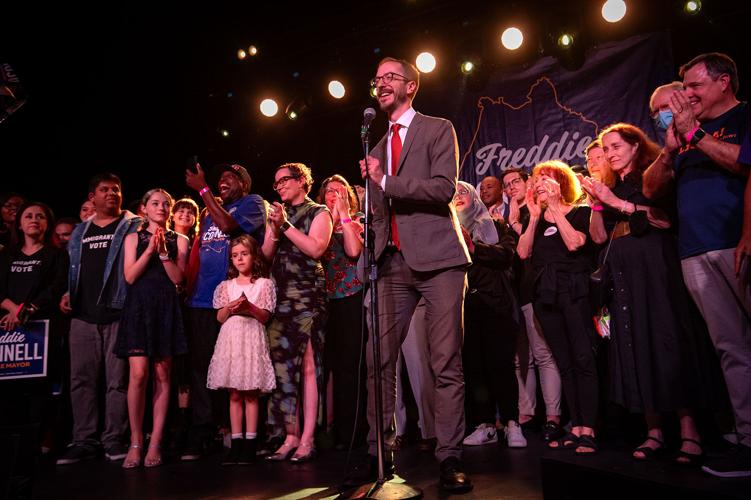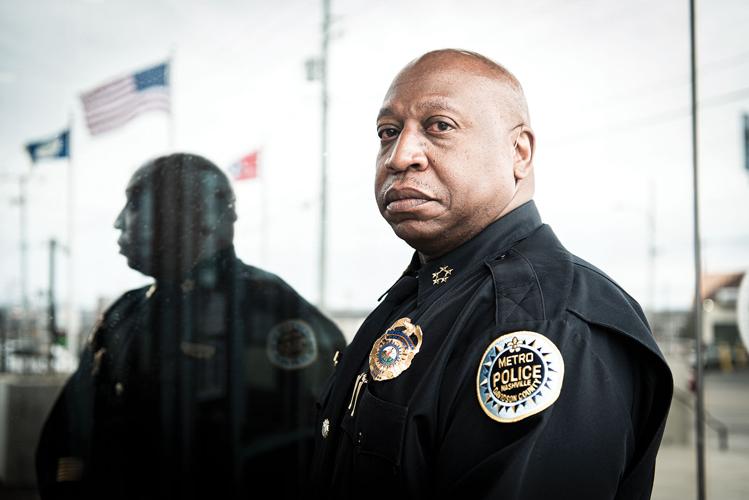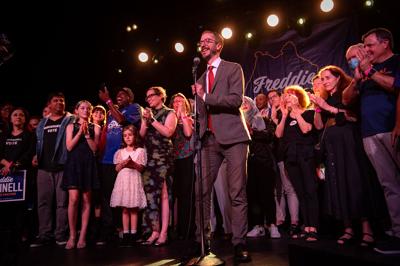Metropolitik is a recurring column featuring the Scene’s analysis of Metro dealings.
Early on Jan. 31, reporters started getting texts from TJ Ducklo. “Call me,” said the mayor’s spokesperson. There was a surprise press conference downtown, scheduled for midmorning. Ducklo told media they wouldn’t want to miss it: The mayor had news.
Police and fire unions had endorsed Mayor John Cooper for reelection just days before. At the time I called Cooper’s reelection “the city’s worst-kept secret,” a foregone conclusion for a man who had set up big projects on long timelines and was actively fundraising into a campaign account. Eighteen hours before Cooper bowed out of the 2023 race, Ducklo, then the mayor’s communications chief, was rounding up reporters for an off-the-record roundtable about Metro’s response to the new state legislative session.
At 11 a.m., Cooper broke the news that he wasn’t seeking a second term, a starting pistol for a long and crowded mayor’s race that finally wrapped up on Sept. 14. Cooper came into office touting his background in business and penchant for real estate, a streak that has Nashville embroiled in an array of ambitious projects that Cooper leaves at various degrees of completion. It will be up to incoming Mayor Freddie O’Connell to separate the exciting opportunities from the dead ends and the sunk costs from the salvageable. Here are the big ones in order of significance and unfinished-ness.
Titans Stadium Deal
While technically inked, Metro’s $760 million pledge toward a new Titans stadium will require nearly constant collaboration between the team and the city until (and beyond) its ribbon-cutting. The two have entered into a “living deal” on the East Bank, where both entities will together spend lots of money raising a futuristic mixed-use campus around the arena. The Titans officially registered Tennessee Stadium LLC, referred to as StadCo in official documentation, as its go-between entity to run the new site — similar to the Predators’ Powers Management at Bridgestone Arena. O’Connell, who just wrapped two terms as the Metro Council’s District 19 representative, was a chief critic of the stadium deal when it came in front of the council in the spring. He repeatedly affirmed his commitment to a long and fruitful partnership with the Titans over the next few years.
The Global Mall at Crossings
Despite few details and loose commitments, Cooper and his deputies cajoled the council to close on a $46 million acquisition of the Global Mall in April 2022. After the city bought the mall, Vanderbilt University Medical Center would stand up an extensive health care outpost à la 100 Oaks, went the story. Cooper brandished a letter of intent with VUMC and chose the site for his 2022 State of Metro address.
“I cannot identify a time in recent memory where Metro bought public land specifically to become a landlord soliciting commercial tenants,” O’Connell wrote to his constituents at the time. “This is an unprecedented investment approach, and it seems to carry unusual risk.”
Negotiations began to drag almost immediately. “We are hopeful that VUMC will continue to participate in the project in a scaled-down footprint,” Deputy Mayor Sam Wilcox told WKRN in August. Metro’s most recent drafted plans show no VUMC presence at all, instead pitching the space as a combination of artist housing, community green space, transit infrastructure and mixed-use buildings. District Councilmember Joy Styles, who represents the area, continues to preside over the community input process.
NASCAR at the Fairgrounds
Bristol Motor Speedway ran up against a tight end-of-term timeline — alternately seen as an unfortunate miscalculation of the Metro meeting calendar or a strategic scheduling scheme by Councilmember Colby Sledge — forcing the regional track operator to halt its Fairgrounds Nashville push in August. At July’s marathon community meeting, at least one pro-track Calvert Street lobbyist was overheard saying they’d be back in force to secure the $117 million fairgrounds renovation after both the council and the mayor’s office turn over in the fall.
Wharf Park
Perhaps more than any other project, Wharf Park was John Cooper’s white whale. Guided by a vision for transformative riverfront urbanism, Cooper pushed the council to acquire 88 Hermitage Ave. for $20 million in June 2022 after opposing a plan to purchase the same parcel from the state for $11 million in 2019, while he was an at-large councilmember. Cooper got a lot of flack for buying high but justified the purchase as a one-two punch of historic preservation and inspired city planning that would add a waterside jewel to the Metro Parks system. At the time, O’Connell called it a “strategic acquisition” that should have been bought the first time for half the price. Public meetings ended in January with a promise to post Metro’s final draft master plan, which isn’t up yet. Promotional PowerPoints envision a landscaped greenway snaking down to the Cumberland — 14 acres fully refurbished for an estimated $70 million. About $24 million of that goes toward a city boathouse, Cooper’s gift to Nashville’s rowing community.
Participatory Budgeting
Direct allocations for city improvements typically come every year via Metro’s Capital Improvements Budget and the mayor’s Capital Spending Plan. Participatory budgeting started under Cooper with $2 million for North Nashville and Bordeaux in 2021 to find and fund critical neighborhood infrastructure via a parallel process that included project proposals and open voting. Two more rounds followed, culminating in a $10 million pot this year pulled from American Rescue Plan money. Critics — like O’Connell’s friend and supporter Whitney Pastorek, who resigned from the PB steering committee in May — call the process an overly burdensome sea of red tape that delays city improvements. Proponents, like Fabian Bedne of Cooper’s office, emphasize the philosophical and practical benefits of direct democracy. O’Connell has promoted PB on his newsletter but said in January that he’d like to track participation to see who’s actually making decisions.
PSC Scrapyard
The city’s most literally unfinished business might be Carl Icahn’s real estate play on the former site of PSC Metals. The billionaire has orchestrated a lucrative hostage situation on the East Bank, where he owns about 45 acres of land abutting Metro’s future mixed-use campus. No vision of a clean redevelopment includes the mountains of metal and scrap currently residing on Icahn’s land. In 2022, Cooper told The Tennessean his strategy was (roughly) to wait for Icahn to die. The city holds little leverage, and negotiations between the two parties have gone nowhere. State economic official Stuart McWhorter is angling with Icahn’s son, Brett, according to the latest buzz, teasing the possibility of a city-state combo deal that could give O’Connell easy relief from the East Bank’s current biggest burr.
Jefferson Street Cap
Remember when a Jefferson Street cap would repair the harms of decades of racist urban policy in North Nashville? The Metro Council paused the project when it withheld critical funding in 2021 in response to wary residents who saw the cap — an expensive and expansive concrete plaza that would cover I-40 between Jefferson and Scovel Street — as a table-setting for increased speculative real estate capital and subsequent displacement. At an eye-popping $120 million, the project was contingent on $72 million in federal grant money to complement $48 million from the city. While deadlines have passed and momentum has stalled, the Nashville Department of Transportation’s Cortnye Stone tells the Scene that Metro got a $3 million federal allocation to continue planning improvements in the Jefferson Street corridor throughout 2023 that may or may not include a cap.

MNPD Chief John Drake
Police Shortages
Failed conservative mayoral candidate Alice Rolli made police her No. 1 campaign issue in the runoff, emphasizing the city’s deficit of Metro Nashville Police Department officers and referring to a general morale crisis among MNPD’s rank-and-file. The city’s police have indeed struggled with turnover and vacant positions. Three years later, the Metro Finance Department is still waiting on reimbursements from FEMA worth $7 million for “Tornado Watch,” a police overtime program in tornado-affected areas that ran through September 2020 and cost the city $13 million total. If that doesn’t come through, it could be an additional black eye for MNPD management teeing up additional funding requests for a new training facility and automated license plate readers, which O’Connell already challenged as a councilmember. O’Connell has repeatedly expressed his faith in MNPD Chief John Drake, an indication that he will leave MNPD to sort itself out.
Climate Changes
Cooper signed onto the Global Covenant of Mayors, an environmental coalition that focuses on city-level solutions, almost immediately upon taking office in 2019. His emissions goals were way behind recommended national targets and lacked step-by-step planning, but for a second, it looked like something. Early enthusiasm turned into sporadic gestures — like a strongly worded letter last summer opposing the TVA’s fossil fuel expansion — and Metro climate work has since fallen to sustainability chief Kendra Abkowitz. O’Connell passed a suite of climate bills in 2019 (which he dubbed a “Green New Deal for Nashville”) as a senior councilmember. He’s shown enough interest and knowledge to make effective climate-friendly interventions from city hall. As mayor, he could do a lot more.







